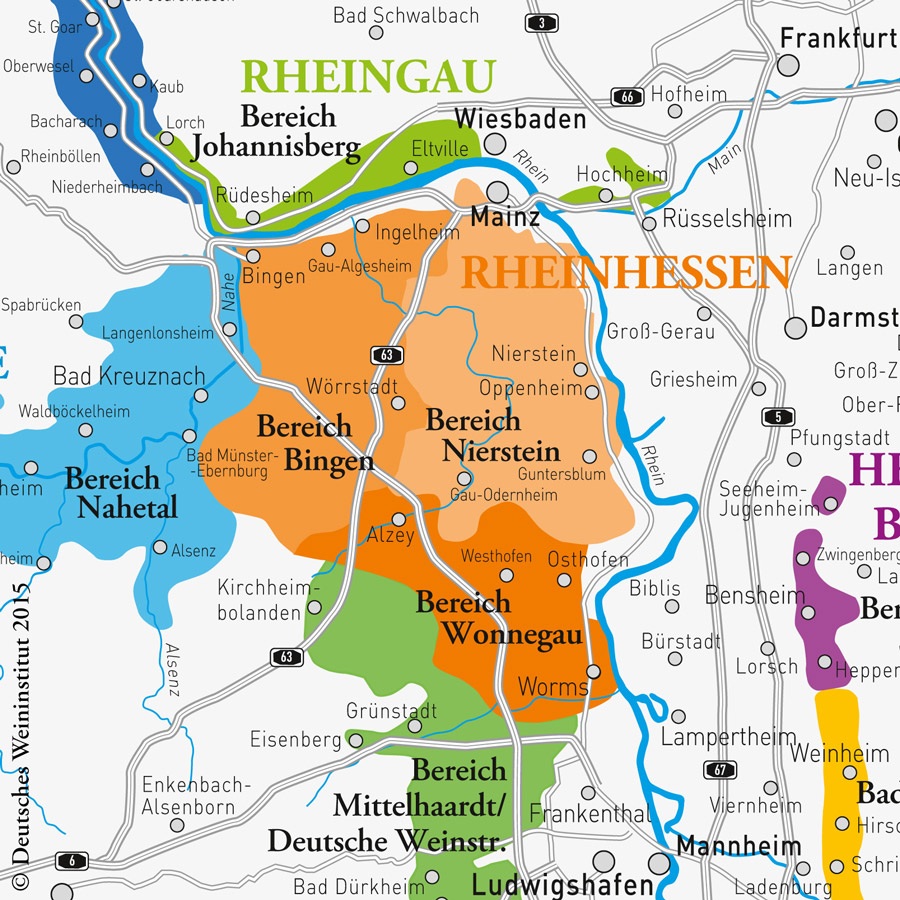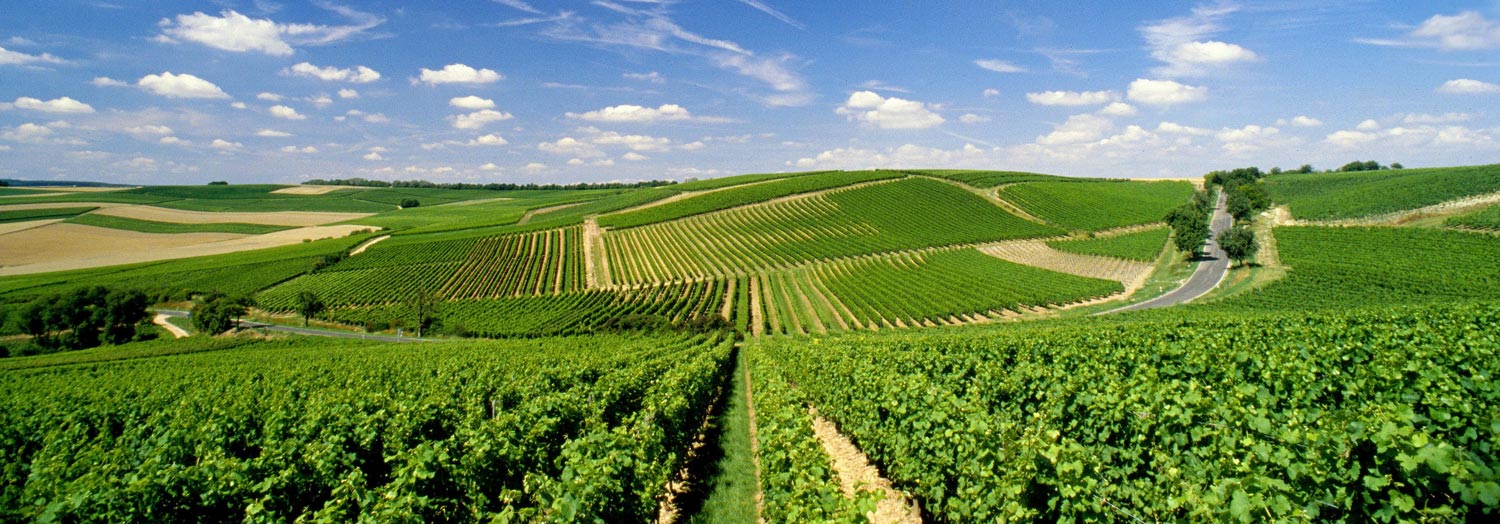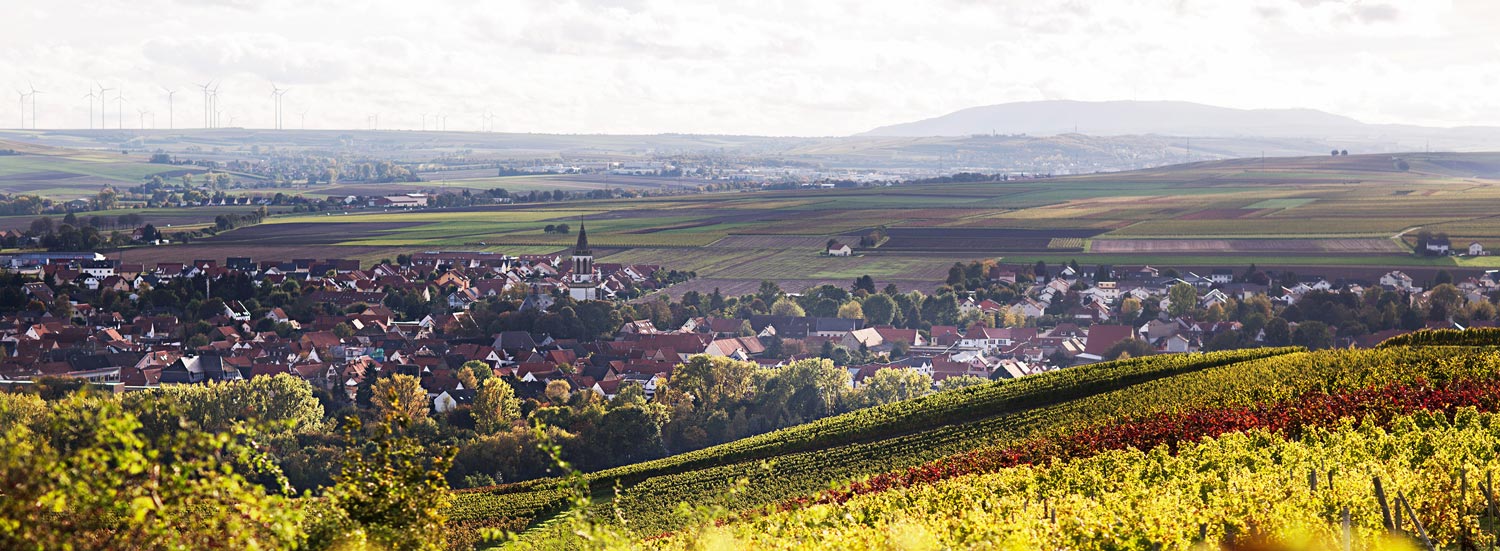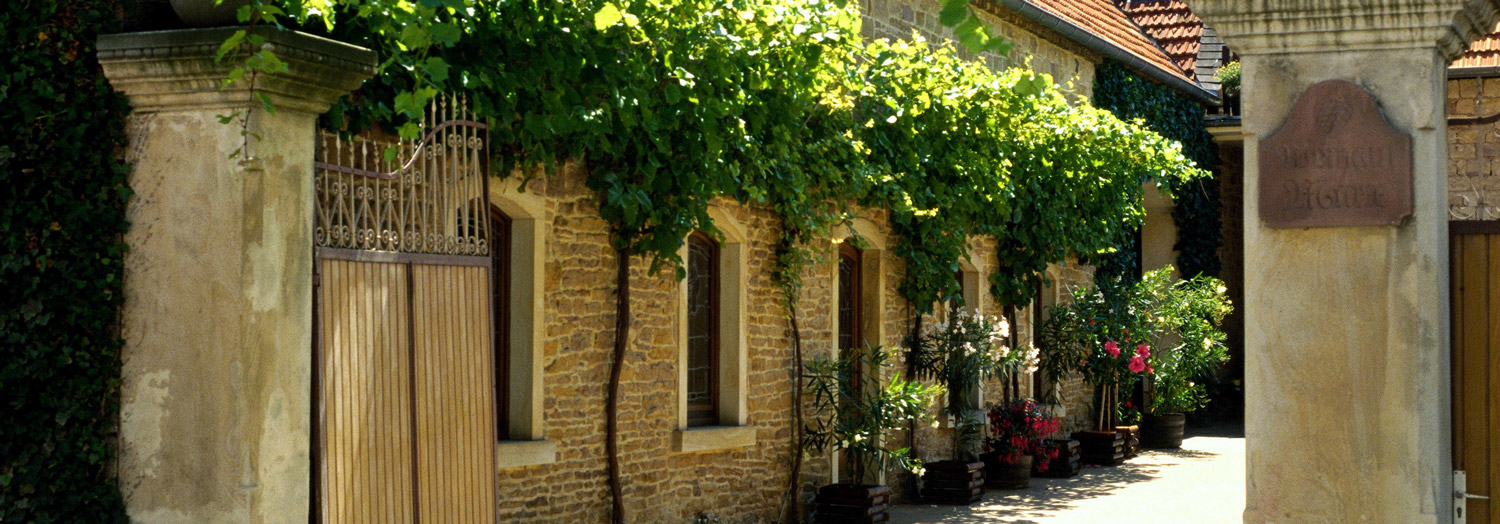 ©German Wine Institute(DWI)
©German Wine Institute(DWI)Rheinhessen is one of the most popular destinations among the German wine regions. With around 27,000 hectares of vineyards, Germany's largest wine-growing region is also one of the most dynamic tourist areas in the federal state of Rhineland-Palatinate. Most visitors are day trippers and weekend excursionists. They come not only to get to know the wines and winegrowers, but also the landscape. This works excellently on the well-developed network of cycle paths and hiking trails.
Wine lovers experience particularly impressive nature and landscapes on the nine "Hiwwelt" tours. "Hiwwel" is the Rhine-Hessian word for hill. And there are plenty of them in the triangle between Mainz, Worms and Bingen - gently rolling, easy to tackle even for the inexperienced. The "Hiwweltour" through the Aulheim valley near Flonheim was voted Germany's second most beautiful hiking trail by the readers of the magazine "Wandermagazin" in 2022. The "Hiwweltour" Heideblick through Rheinhessische Schweiz is also charming - best in August and September when the heath is in bloom. A must here is a stop at the Winzeralm above Siefersheim, where hikers are rewarded with magnificent views of the wine-growing landscape and are treated to wine and small snacks by the Zimmermann winery.
Those looking for something special will find it in Lonsheim. Winemaker Andreas Mohr invites visitors to wine safaris. In a Land Rover Defender 110 from the British Army of the Rhine, built in 1988 and painted to look like a zebra, Mohr takes his guests on a tour of discovery and enjoyment through the vineyards. During the rest stops, wines from the estate are tasted and small snacks are served. But Rheinhessen offers much more than its hills of vines. Interesting sights can be seen in the towns and cities of the region. First and foremost, Mainz is the "Great Wine Capital" with St. Martin's Cathedral, the Gutenberg Museum or the famous Chagall windows in St. Stephen's. Strolling through the picturesque old town, you will come across many quaint wine taverns where you can enjoy the speciality "Mainzer Handkäs" with a good glass of wine - with or without "music", i.e. a vinaigrette with raw onions, as you like.
Visitors can dive into the Middle Ages on a tour of the Oppenheim cellar labyrinth. There are up to 20 cellars on five levels among the 500 properties in the hillside old town. Afterwards, it is worth visiting St. Catherine's Church, which, along with Cologne Cathedral and Strasbourg Cathedral, is one of the most important Gothic buildings on the Rhine. In the Völker restaurant right next door, you can not only dine exquisitely, but also experience the German TV classic "Dinner for One" on the theatre stage three storeys below the earth's surface - and in the Rhine-Hessian dialect. The cultural gem is embedded in a three-course meal in the restaurant. If you are out and about on Sundays, you should definitely make a detour to Nierstein, which is in the immediate vicinity. On the market square is the Palaeontological Museum - a jewel for all those who are enthusiastic about million-year-old fossil finds. A hike across the Rote Hang, one of the world's top terroirs for Riesling, will reward you with panoramic views of the Rhine Valley, the low mountain ranges of Taunus and Odenwald, and the skyline of Frankfurt ("Mainhattan").
 |
The towns of Worms, Alzey and Bingen also offer attractive tourist discoveries. In the town of the Mouse Tower in the Rhine - one of the region's best-known photo motifs - a stroll along the Rhine promenade is both relaxing and stimulating. For the gardens designed for the State Garden Show as well as the museums and the well-stocked vinotheque make the promenade directly on the Rhine with a view of the steep vineyards of the Rheingau a meeting place, cultural experience, open-air stage, playground, wine and culinary location all in one. In the larger towns, guests can also find what is a big problem in the villages on weekdays, and here especially during the day: places to stop for refreshments. Restaurants and wine taverns in the Rhine-Hessian province are mainly open in the evenings and often only at weekends.
In view of the influx of tourists, another problem also comes into focus: There are too few hotel beds in Rheinhessen. But something is happening, as the hotel "Papa Rhein", which opened in July 2020 directly on the banks of the Rhine in Bingen, proves. The extravagantly designed hotel offers everything that makes a top hotel - including sophisticated gastronomy, because the chef at "Papa Rhein" is the well-known former star chef Nils Henkel. The overnight offers at wine farms, which can be found all over Rheinhessen, are also popular. One example where upscale gastronomy and hotel business as well as excellent winegrowing form a harmonious unit is the Espenhof in Flonheim-Uffhofen (***). Nico Espenschied produces wines with depth and typicity, his sister Lena entertains the guests of the wine tavern with culinary creations. Those who have enjoyed both will also find stylishly furnished night quarters in the estate's country hotel. This is also the case at Jordan's Untermühle in Köngernheim. Idyllically situated in the valley of the Selz, travellers can relax in the "Herz&Rebe" spa, which is as spacious as it is stylish, and then let themselves be pampered by the excellent cuisine.
 |
Since nowhere else in Germany grows as much wine as in Rheinhessen, the vines not only characterise the landscape, but there are also many experiences to be had - from wine tasting to guided hikes through the vineyards to vineyard tours. The Sternenfelserhof winery in Nierstein is one of the businesses that offer the two-hour tours with traditional "Weck, Worscht und Woi" (bread rolls, sausage and wine). Jana Kopp and her father Rudolf also offer visitors enjoyable insights and views during wine walks or a cellar tour with red wine tasting.
Rheinhessen is not only the largest, it is also considered the most dynamic of the German wine-growing regions. The winegrowers are the driving force behind this dynamism. That's why there are plenty of discoveries to be made for wine fans on a tour through the "Land of 1000 Hills". One example is the Cistercian Michel Winery in Dittelsheim-Heßloch. Founded by monks in 1173, the estate is now run by Ulrich and Karen Michel in the eighth generation with a breath of fresh air and a fine feeling for the product. Another example is the winery of Frank and Felix Hemmes in Bingen-Kempten. Here, racy Rieslings meet idiosyncratic cuvées from the estate's excursion line. In the former classrooms of the village school, Hemmes has set up a vinotheque including a wine school with interesting offers. Two examples of many.
 |
In terms of gastronomy, Rheinhessen has a lot to offer, even though the density of top restaurants is much higher in other wine-growing regions. Nevertheless, there are also some in Rheinhessen. For example, Steins Traube in Mainz-Finthen or Kaupers Kapellenhof in Selzen. Here, gourmets and wine lovers alike get their money's worth. The cellars of both restaurants are well-stocked. The grand seigneur of gourmet cuisine in Rheinhessen is Wolfgang Dubs. He opened his Rôtisserie in the Rheindürkheim district of Worms back in 1969. Today, Dubs welcomes guests to his "Landhaus" in the midst of the Osthofen vineyards. Here, French culinary tradition enters into an enjoyable liaison with Rhine-Hessian down-to-earthness.
The many "Straußwirtschaften" (wine taverns) and "Gutsschänken" (wine taverns) are more informal. These can be found in most of the 133 wine-growing towns in the Rhine region. If you want to spend a few convivial hours and talk to the locals, this is the place to be. On the menu you will find hearty standards such as the Rhine-Hessian national dish, the "Spundekäs" (cream cheese preparation with sweet paprika and onions), but also ambitious creations. The wine quality, however, varies greatly. Outstanding here are, among others, the Straußwirtschaften and Gutsschänken of the Bettenheimer (Ingelheim), Beiser (Vendersheim), Gres (Appenheim) and Geil (***) (Monzernheim) wineries.